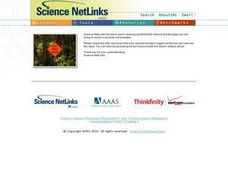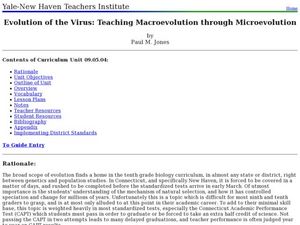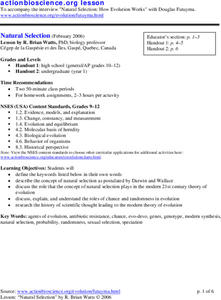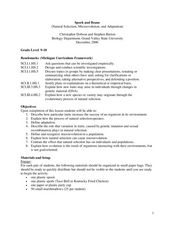Curated OER
The Effect of Natural Selection on Genes, Traits and Individuals
Rotating through five stations, evolutionary biologists explore the question of how changes in DNA facilitate the changes in a population over time. High-quality, colorful cards of animals, skeletons, skulls, and DNA sequences can all be...
Curated OER
Natural Selection Day 1
Young scholars define the concept of classification. In groups, they categorize a series of objects into categories they identify. As a class, they participate in a variety of activities to examine the concept of natural selection. To...
Curated OER
Comparing Theories: Lamarck and Darwin
Students compare the evolution theories of Lamarck and Darwin. They use self-assessment and a video to increase their knowledge of evolution theories. They research questions and present them to the class.
LABScI
Genetic Equilibrium: Human Diversity
Investigate the Hardy-Weinberg Principle to explain genetic equilibrium. The 10th lesson plan of a series of 12 is a laboratory exploration of genetic equilibrium. Your classes use a mixture of beans to model allele and genotype...
Curated OER
How Does Evolution Work?
Learners investigate how natural selection influences evolution. They complete a hands-on lab simulation of natural selection, and replicate a real experiment and examine the interplay between selection factors in a population of guppies.
Curated OER
Mice Rule!
Students explain what biodiversity is and how adaptive features are maintained in a population. In this biodiversity lesson students complete a simple activity involving mouse populations.
Beyond Benign
What is Biotechnology
Examine the sequence of key events in the history of genetics. An engaging lesson plan asks scholars to sort events to create a timeline of biotechnology milestones. Arranging the events gives learners a perspective on the...
Towson University
Mystery Disease
How did scientists determine the cause of illness before technology? Science scholars play the role of medical researcher in an engaging guided inquiry activity. Using observations, technical reading, and Punnett squares, learners...
Beyond Benign
Crossing Hairs
Can you breed the perfect cat? Scholars study how to control genetic traits through breeding. The 15th instructional activity in a 18-part genetics unit considers the process of cross-breeding to develop a cat with a specific set of...
Curated OER
Evolution of the Virus: Teaching Macroevolution Through Microevolution
Students describe the anatomy of a virus. In this biology lesson, students compare and contrast the characteristics of bacteria and viruses. They discover the genetic adaptations of viruses over time.
Curated OER
Basic Introduction to Foundation of Life: Genes, Genetics and Genetic Diseases
Students are introduced to genetics along with genetic diseases and heredity. In groups, they complete a Punnett Square to determine the dominant and recessive genes. After viewing diagrams, they identify the characteristics of DNA and...
ARKive
Biodiversity and Evolution – Darwin’s Finches
Teens experience natural selection firsthand (or first beak) in an activity that has them act as finches foraging for food. Using different household items to act as different beak styles, your little finches will collect as much...
Curated OER
Natural Selection: Exploring the 'Ohi'a Common Garden
Seventh graders examine natural variation by visiting the Ohi'a Common Garden in Volcano, Hawaii. In this natural selection lesson, 7th graders study background information about phenotypes, genotypes, and phenotypic plasticity before...
Curated OER
Natural Selection
Students use discussion questions, handout information and research topics to explore several issues related to natural selection and evolution. They examine Darwin's research on the finch and antibiotic resistance.
Beyond Benign
Great Expectations Through Modification
Explore the changes genetic modifications make just to make it in our world. Scholars track the production of insulin over time and discover how genetic modifications make the treatment of diabetes possible.
Learning Games Lab
Nitrogen in Pollutants
Responsible farming is important for maintaining natural resources. Eager scientists complete a WebQuest to explore what happens to nitrogen when it enters the soil. They learn about the chemical makeup of nitrogen-based molecules...
Curated OER
Spork and Beans
Learners examine natural selection, how it works and how it can cause microevolution. In this evolution lesson students complete a lab activity that shows the effects that natural selection has on organisms.
Curated OER
Why Do People Fall in Love?
Students discuss human behavior, sexual selection and the underlying genetic and evolutionary reasons for mate selection. The, in groups, they rate the attractiveness of certain individuals and measure facial features for symmetry.
Curated OER
Genetic Engineering of Crop Plants
Students explore genetic engineering and it biological and ethical implications. By conducting experiments with genetically engineered corn and plain corn they determine the difference in taste. Students also discover the effects of...
Curated OER
Genetics 4 Mutations
Students identify and illustrate how changes in DNA cause mutations and evaluate the significance of these changes. They illustrate a chromosomal mutation such as duplication, deletion, inversion, and translocation.
Curated OER
Genetic Engineering
Students examine the advantages and disadvantages of genetic engineering. In this genetics lesson students simulate the genetic engineering of a human insulin gene.
Curated OER
Teacher Preparation Notes on Genetics
Students explore genetics through various hands-on activities. In this biology lesson, students predict the probability of offspring genotypes and phenotypes using the Punnett Square. They explain the causes of genetic abnormalities.
Curated OER
Genetics: Who are you?
Study, manipulate, and research genetic traits. Discuss how genetic traits are passed from one generation to another. Classmates explore how they look like their parents and debate whether or not they can do anything about it? They...
Curated OER
Genetics: Mice Rule! (Or Not)
Students explore genetics and evolution by examining a hypothetical mouse population. Using coin tosses, they determine mouse traits of parents and offspring. Finally, they consider the outcomes of changing environmental conditions on...























